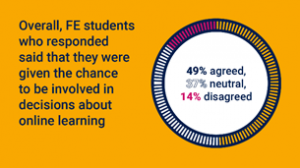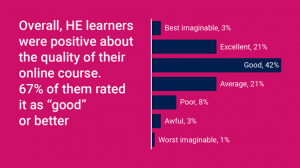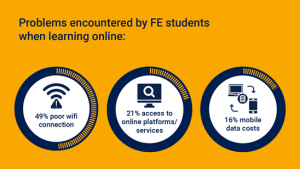At a time when learning was disrupted by the coronavirus pandemic, our 2020/21 student digital experience insights survey findings highlight many positives and examples of good practice to build on for the future as well as some areas of concern.
A record number of 62,658 students from further education (FE) and higher education (HE) across the UK participated in the survey which asked learners to focus specifically on online learning and on their experiences in the two weeks immediately prior to taking the survey.
A positive response to online learning
While only 3% of FE learners and 8% of HE students expected their learning to be fully online, the reality was that high numbers found this to be the situation (FE: 40% online with a further 35% participating in a mix of onsite and online learning, HE: 87% online and a further 12% mix of on site and online). Despite the unexpected learning situation, 66% of FE and 67% of HE students rated the quality of their online and digital learning as ‘best imaginable’, ‘excellent’ or ‘good’.
Aspects of online and digital learning that students valued included:
- Efficient use of time (extra time available for study)
- Flexibility in learning place, time and to work around other commitments
- Pace – recorded lectures and online learning enabled them to go back over content, to do further research if they didn’t understand
- Engagement – learners valued small group work, breakout rooms, quizzes and other interactive aspects
- Easy access to learning resources
- Reduced distractions
- The help and support received
- Convenience and safety in continuing to study
Appreciation for the efforts of colleges, universities and their staff
Learner quote: “Some lecturers have gone above and beyond – they have integrated online quizzes, provided video support for every lecture, created custom videos exploring class topics – really making use of the online format.”
Student quote: “The online seminars are my favourite part of the course; they give good opportunities for discussion with lecturers and students.”
Evidence of a growing digital divide
However, some experienced problems that prevented them from engaging fully online. Significant issues included:
- Poor wifi connections (FE: 49%,HE: 63%)
- Access to online platforms/services (FE: 21%, HE: 30%)
- Mobile data costs (FE: 16%, HE: 24%)
- No safe, private place to work (FE: 12%, HE: 21%)
- No suitable computer/device (FE: 14%, HE: 15%)
The data also shows that some ethnic groups were more likely to encounter barriers than the student population as a whole.
Areas of concern
In addition to technical and access issues, some students reported learning experiences that were unengaging, that were delivered at too fast/too slow a pace or felt overwhelmed by the volume of work and difficulties in concentration from being online too much. These obviously had a detrimental impact on their wellbeing.
Students are getting more involved in decisions about their digital experiences
This year 49% of FE learners and 35% of HE students said they had been given the chance to be involved in decisions about online learning. These are substantially more positive responses than given to similarly phrased questions in previous years and echo the Office for Students recommendations in Gravity Assist, that colleges and universities work in partnership with students to ensure their voices inform strategic planning and decision making and involving them in co-design.
 Students were keen to offer their views about how their experience could be improved:
Students were keen to offer their views about how their experience could be improved:
Learner quote: “Advertise online skills more, there’s many people who need it but don’t know anything about training being offered to them.”
See the digital experience through the eyes of your students’ and staff
As we start the new academic year, the survey findings will be of interest to colleges and universities as they continue to develop effective practice to ensure our students have the best digital experience possible.
Student quote: “Ask the students what sort of teaching they would like online and what activities work best.”
Our 2021/22 digital experience insights survey will open in October 2021. Find out more about your students’ digital experience and how you can participate in any of our surveys for students, teaching staff and professional services staff and researchers.


